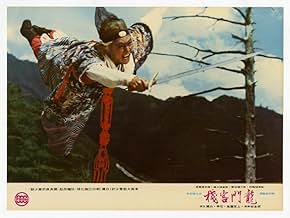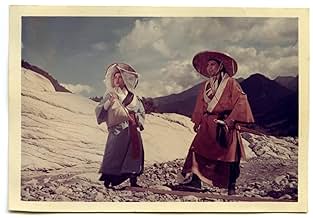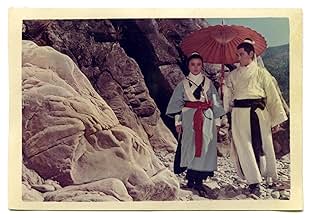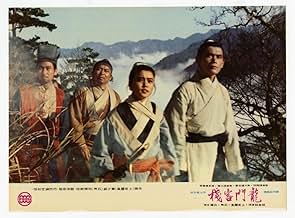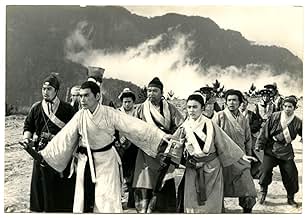IMDb रेटिंग
7.4/10
4 हज़ार
आपकी रेटिंग
अपनी भाषा में प्लॉट जोड़ेंWhen the children of an executed General are pursued in 1457 China, some heroic martial arts swordsmen intervene.When the children of an executed General are pursued in 1457 China, some heroic martial arts swordsmen intervene.When the children of an executed General are pursued in 1457 China, some heroic martial arts swordsmen intervene.
- पुरस्कार
- 1 जीत और कुल 1 नामांकन
फ़ीचर्ड समीक्षाएं
10Deusvolt
I saw this during its initial run under the title "Dragon Inn."
This is no ordinary swordplay movie. It is a visual treat of ancient Chinese costumes and weaponry. The traditional Chinese instruments used for the background music added an otherwordly flavor. I left the theatre wondering if the movie was truly historical.
The head of the Yu clan has been condemned to death by the evil prime minister who has usurped imperial power. A palace eunuch who managed to claw his way to power, he is also reputed to be China's greatest swordsman. He plots to eliminate the entire Yu family but is opposed by a master swordsman and swordswoman.
A memorable scene that has nothing to do with fighting is the dinner at Dragon Inn which introduced me to the Mongolian Fire Pot (shabu-shabu) style of eating. To the uninitiated, there is a fire pot in the middle of the table decked out with all sorts of raw food which you put into the boiling water of the firepot and eat them as they are cooked. The cooking water is sipped as soup.
I took my little sister to see it and from then on she got hooked on Chinese swordplay movies. She began reading up on ancient China and in college she majored in history and archaeology -- all because I took her to see Dragon Inn.
I am gratified to learn recently that the female supporting actress Feng Hsu moved on to become a producer-director herself with a number of critically acclaimed films to her credit. I look forward to seeing them soon.
This is no ordinary swordplay movie. It is a visual treat of ancient Chinese costumes and weaponry. The traditional Chinese instruments used for the background music added an otherwordly flavor. I left the theatre wondering if the movie was truly historical.
The head of the Yu clan has been condemned to death by the evil prime minister who has usurped imperial power. A palace eunuch who managed to claw his way to power, he is also reputed to be China's greatest swordsman. He plots to eliminate the entire Yu family but is opposed by a master swordsman and swordswoman.
A memorable scene that has nothing to do with fighting is the dinner at Dragon Inn which introduced me to the Mongolian Fire Pot (shabu-shabu) style of eating. To the uninitiated, there is a fire pot in the middle of the table decked out with all sorts of raw food which you put into the boiling water of the firepot and eat them as they are cooked. The cooking water is sipped as soup.
I took my little sister to see it and from then on she got hooked on Chinese swordplay movies. She began reading up on ancient China and in college she majored in history and archaeology -- all because I took her to see Dragon Inn.
I am gratified to learn recently that the female supporting actress Feng Hsu moved on to become a producer-director herself with a number of critically acclaimed films to her credit. I look forward to seeing them soon.
Long considered one of the masterpieces of the wuxia genre King Hu's "Dragon Inn" is a visually superb epic that's closer in tone to Leone than Kurosawa and it features some of the most balletic fight sequences in all of cinema. The plot is virtually irrelevant; there are good guys and there are bad guys and that's really all you need to know while even the comedy works beautifully. The action takes place almost entirely around the inn of the title and the film was further immortalised by Ming-liang Tsai when he chose it to be the film screening in the near empty cinema in "Goodbye, Dragon Inn", (they would make a great double-bill). It's been surpassed in people's affections by King Hu's later "A Touch of Zen" but this is arguably more fun and it established Hu as a force to be reckoned with in international cinema, a genre master as well as a great visual stylist. Wonderful.
I speculate that King Hu must have left Shaw Brothers with a bad taste in his mouth after doing "Come Drink With Me". "Come Drink with Me" is also one of the greatest martial arts movies despite having room for improvement. This movie feels to me like King Hu made those improvements in it. I consider this his is his masterpiece. I compare it to the movies of Akira Kurosawa. Too bad that King Hu was nowhere near as prolific. This movie could even be considered his one hit wonder.
King Hu seemed to realize the claustrophobic situation of of the good guys and bad guys face to face in the Dragon Inn was great drama but it had to be contrasted with as much wide open space as possible. In "Dragon Inn" most scenes outside the inn are shot in expansive panoramas. Like Kurosawa, King Hu appreciated the way moving the camera brought the audience into the scene. He used tracking shots, particularly during fight sequences, to get this feeling.
Hang Ying-Chieh gets credit as action coordinator. He was the Big Boss in Bruce Lee's "The Big Boss". Remember when Bruce is cut, wipes off his blood then tastes it? Hang Ying-Chieh does the same here. The sword fights are Japanese style - starting with a suspenseful face off, then a sudden attack to cover the distance, just a few quick strokes of action, then stop and wait a few seconds to feel the results. A real sword cut is initially almost painless so the person cut doesn't know until he sees the effect of the cut.
I rate this as one of the best of 1967 and I recommend it to everyone - not just fans of the genre - to everyone.
King Hu seemed to realize the claustrophobic situation of of the good guys and bad guys face to face in the Dragon Inn was great drama but it had to be contrasted with as much wide open space as possible. In "Dragon Inn" most scenes outside the inn are shot in expansive panoramas. Like Kurosawa, King Hu appreciated the way moving the camera brought the audience into the scene. He used tracking shots, particularly during fight sequences, to get this feeling.
Hang Ying-Chieh gets credit as action coordinator. He was the Big Boss in Bruce Lee's "The Big Boss". Remember when Bruce is cut, wipes off his blood then tastes it? Hang Ying-Chieh does the same here. The sword fights are Japanese style - starting with a suspenseful face off, then a sudden attack to cover the distance, just a few quick strokes of action, then stop and wait a few seconds to feel the results. A real sword cut is initially almost painless so the person cut doesn't know until he sees the effect of the cut.
I rate this as one of the best of 1967 and I recommend it to everyone - not just fans of the genre - to everyone.
This is the original of the 1992 remake of the same title(with a NEW) and 2nd of the "INN" trilogy by King Hu after Come Drink With Me. It was a major hit all over Chinese areas in South East Asia and discovered Shang Kuan Ling Feng(note the mistake by a previous comment)as the 2nd most popular Sword woman(the 1st was Cheng Pei Pei, and later 3rd Hsu Feng(Hsia Nu aka A Touch of Zen). All these 3 females stars are made popular by him and they are also the 3 most popular swords women in Chinese Cinema.
If there is any complaint by any viewer, it's the pace that many may find it a bit slow but isn't most highly regarded movies slow ?? The finale scene is the most climatic in a Chinese action that critc compared this film to "Rio Bravo" and "The Wild Bunch".
Beware of some mistakes in the original English subtitles mentioned by the director himself.
You can watch some scenes of it if you go to the movie Bu San(2003) aka Goodbye, Dragon Inn(here in IMDb and watch the trailer) which paid tribute to this movie.
The 90's remake is nothing better except for an additional character well acted by Maggie Cheung.
If there is any complaint by any viewer, it's the pace that many may find it a bit slow but isn't most highly regarded movies slow ?? The finale scene is the most climatic in a Chinese action that critc compared this film to "Rio Bravo" and "The Wild Bunch".
Beware of some mistakes in the original English subtitles mentioned by the director himself.
You can watch some scenes of it if you go to the movie Bu San(2003) aka Goodbye, Dragon Inn(here in IMDb and watch the trailer) which paid tribute to this movie.
The 90's remake is nothing better except for an additional character well acted by Maggie Cheung.
I saw this film in the 60's, and have yet to find one to beat it. 'Hidden Dragon, Crouching Tiger' has to come in behind this masterpiece. The use of new actors and actresses, the adoption of well-timed traditional Chinese music, e.g. to usher in the villain, the innovative action sequence in sword fights, all added to the brilliance of this film.
Yes, there are shortcomings. Toward the end, and the climax, the anti-gravity leaps to the trees were overdone and unnecessary. Regardless, this film resembles the best of the traditional, addictive Chinese martial art novels that once consumed many hours of the armchair martial art addicts.
Yes, there are shortcomings. Toward the end, and the climax, the anti-gravity leaps to the trees were overdone and unnecessary. Regardless, this film resembles the best of the traditional, addictive Chinese martial art novels that once consumed many hours of the armchair martial art addicts.
क्या आपको पता है
- ट्रिवियाDirector King Hu encouraged his martial arts choreographers to draw from the alternately fluid and rhythmic movements of Chinese opera. Rather than resorting to fast or slow motion, footage printed backward, animation, or other early special-effects techniques, the filmmaker relied as much as possible on the actual skills of his performers and on the magic of editing.
टॉप पसंद
रेटिंग देने के लिए साइन-इन करें और वैयक्तिकृत सुझावों के लिए वॉचलिस्ट करें
- How long is Dragon Inn?Alexa द्वारा संचालित
विवरण
इस पेज में योगदान दें
किसी बदलाव का सुझाव दें या अनुपलब्ध कॉन्टेंट जोड़ें



